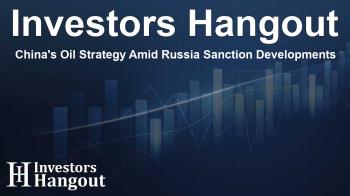China's Oil Strategy Amid Russia Sanction Developments

Understanding China's Oil Import Decisions
Recent developments in global oil markets have brought attention to how China responds to substantial changes, particularly surrounding sanctions on Russia's crude oil exports. With the latest sanctions imposed by the U.S., there is a renewed focus on how Beijing will navigate these turbulent waters.
Commodity prices are often susceptible to geopolitical factors, and in this instance, the new restrictions aimed at Russia have led to a pronounced jump in oil prices. This spike raises questions about sustainability in the market and whether this trend is likely to continue.
Market Reaction to Sanctions
Following the announcement of sanctions, Brent crude prices surged to $82.03 per barrel, marking the highest closing price since last year. The immediate response indicates that market participants are apprehensive about potential supply disruptions, particularly as major refiners, including those in China and India, scramble to find alternative sources amidst fears of limited Russian crude availability.
The sanctions specifically target entities linked to over a third of Russian and Iranian crude exports, and this could lead to significant price fluctuations as reliance on Russian oil diminishes. Observers anticipate a short-term tightening in oil supply while alternatives are sought, predominantly from regions like the Middle East and Africa where crude quality closely resembles Russia's.
China's Strategic Responses
China, the largest crude importer, has a history of adjusting its import strategies in response to market conditions. If crude prices are perceived to be excessively high, Chinese refiners may reduce imports and tap into their strategic reserves. This calculated response allows China to exert some influence on oil prices while waiting for a clearer picture regarding the duration and impact of the sanctions.
Impacts of Import Strategies on Global Prices
By leveraging its vast oil inventories, China can manage its market presence and potentially lower global prices as it refrains from purchasing more crude. This strategy may also be crucial in assessing whether the sanctions represent a long-term shift in market dynamics or merely a temporary adjustment.
Looking ahead, moderate growth in China's oil demand is anticipated, with a forecasted increase of around 310,000 barrels per day in the subsequent years. This growth projection indicates that while demand is steady, China’s decisions will hinge increasingly on global price trends and geopolitical developments.
Long-term Considerations and Adjustments
As sanctions create an environment of uncertainty, there are multiple factors to consider regarding price stability. For example, U.S. policy changes under differing administrations could heighten or relieve sanctions on oil-producing nations like Iran, further complicating market forecasts.
Additionally, continued discussions around U.S. oil production levels play a pivotal role in shaping future oil prices. Increased output from U.S. producers could counterbalance any disruptions caused by the sanctions, potentially leading to a more stable market.
Potential Outcomes of Sanction Responses
The real impact of the sanctions on Russia's oil exports will reveal itself over time. There is speculation about whether Russia might utilize alternative routes for crude exports, such as ship-to-ship transfers or selling to countries willing to overlook the sanctions.
As the geopolitical landscape evolves, it will be critical for global oil markets to adapt swiftly. The interplay between supply, demand, and regulatory influences will ultimately dictate the trajectory of oil prices in the coming months.
Frequently Asked Questions
How are the new U.S. sanctions on Russia impacting oil prices?
The sanctions have led to an immediate spike in oil prices as the market reacts to potential supply disruptions and alternative sourcing challenges.
What strategies might China employ to manage its crude imports?
China may reduce crude imports and rely on its inventory to influence market prices while assessing the longer-term implications of the sanctions.
Can U.S. oil production affect global prices?
Yes, increased output from U.S. producers can help mitigate any price spikes caused by sanctions or disruptions in other regions.
What is the outlook for China’s oil demand in the near future?
China's oil demand is projected for moderate growth, indicating steady consumption patterns amidst fluctuating global prices.
Will Russia find alternative routes for its crude exports?
It is possible that Russia may adapt by utilizing methods such as ship-to-ship transfers or seeking buyers who are less affected by the sanctions.
About The Author
Contact Dylan Bailey privately here. Or send an email with ATTN: Dylan Bailey as the subject to contact@investorshangout.com.
About Investors Hangout
Investors Hangout is a leading online stock forum for financial discussion and learning, offering a wide range of free tools and resources. It draws in traders of all levels, who exchange market knowledge, investigate trading tactics, and keep an eye on industry developments in real time. Featuring financial articles, stock message boards, quotes, charts, company profiles, and live news updates. Through cooperative learning and a wealth of informational resources, it helps users from novices creating their first portfolios to experts honing their techniques. Join Investors Hangout today: https://investorshangout.com/
The content of this article is based on factual, publicly available information and does not represent legal, financial, or investment advice. Investors Hangout does not offer financial advice, and the author is not a licensed financial advisor. Consult a qualified advisor before making any financial or investment decisions based on this article. This article should not be considered advice to purchase, sell, or hold any securities or other investments. If any of the material provided here is inaccurate, please contact us for corrections.

